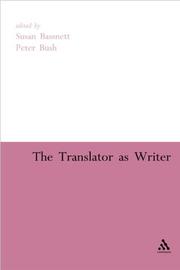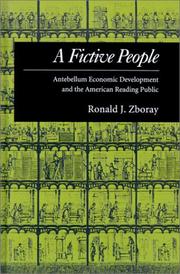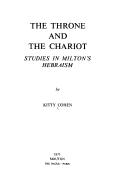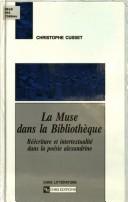| Listing 1 - 10 of 13 | << page >> |
Sort by
|

ISBN: 9781441121493 1441121498 9780826499943 0826499945 0826485758 9780826485755 1283205092 9786613205094 Year: 2007 Publisher: London New York Continuum
Abstract | Keywords | Export | Availability | Bookmark
 Loading...
Loading...Choose an application
- Reference Manager
- EndNote
- RefWorks (Direct export to RefWorks)
Over the last two decades, interest in translation around the world has increased beyond any predictions. International bestseller lists now contain large numbers of translated works, and writers from Latin America, Africa, India and China have joined the lists of eminent, bestselling European writers and those from the global English-speaking world. Despite this, translators tend to be invisible, as are the processes they follow and the strategies they employ when translating. The Translator as Writer bridges the divide between those who study translation and those who produce translations, t
Translating and interpreting --- English literature -- Appreciation. --- Literature. --- Translating and interpreting. --- Languages & Literatures --- Philology & Linguistics --- De vertaler als schrijver. --- Jeugdliteratuur --- Kinderliteratuur --- Literaire vertaling. --- Vertalen --- Vertalen en stijl. --- Vertalen en stilistiek. --- Vertaling en origineel. --- vertalen. --- creativiteit.
Book
ISBN: 1283221624 9786613221629 0748636854 9780748636853 9780748636846 0748636846 9780748636839 0748636838 9780748688692 0748688692 9781283221627 6613221627 0748636846 9780748636846 Year: 2022 Publisher: Edinburgh
Abstract | Keywords | Export | Availability | Bookmark
 Loading...
Loading...Choose an application
- Reference Manager
- EndNote
- RefWorks (Direct export to RefWorks)
Treating the Renaissance as also the period that saw the birth of European colonialism, this book focuses on the interplay between the discovery of new lands and the re-discovery of old texts.
Classical literature -- Appreciation -- Europe -- History. --- Colonies in literature. --- European literature -- Renaissance, 1450-1600 -- History and criticism. --- Postcolonialisme --- Dans la littérature --- Classical literature --- European literature --- Appreciation --- History. --- History and criticism.
Book
ISBN: 9781474260534 9781474260541 1474260551 1474260543 1474260535 9781474260510 1474260519 9781474260527 9781474260558 1474260527 9781474260527 Year: 2016 Publisher: London Bloomsbury Academic
Abstract | Keywords | Export | Availability | Bookmark
 Loading...
Loading...Choose an application
- Reference Manager
- EndNote
- RefWorks (Direct export to RefWorks)
"Fragmented, buried, and largely lost, the classical past presents formidable obstacles to anyone who would seek to know it. 'Deep Classics' is the study of these obstacles and, in particular, of the way in which the contemplation of the classical past resembles -- and has even provided a model for -- other kinds of human endeavor. This v. offers a new way to understand the modalities and aims of Classics itself, through the ages. Its individual chapters draw fruitful connections between the reception of the classical and current concerns in philosophy of mind, cognitive theory, epistemology, media studies, sense studies, aesthetics, queer theory and eco-criticism. What does the study of the ancient past teach us about our encounters with our own more recent but still elusive memories? What do our always partial reconstructions of ancient sites tell us about the limits of our ability to know our own world, or to imagine our future? What does the reader of the lacunose and corrupted literatures of antiquity learn thereby about literature and language themselves? What does a shattered statue reveal about art, matter, sensation, experience, life? Does the way in which these vestiges of the past are encountered -- sitting in a library, standing in a gallery, moving through a ruin -- condition our responses to them and alter their significance? And finally, how has the contemplation of antiquity helped to shape seemingly unrelated disciplines, including not only other humanistic and scientific epistemologies but also non-scholarly modes and practices? In asking these and similar questions, Deep Classics makes a pointed intervention in the study of the classical tradition, now more widely known as 'reception studies'."--Bloomsbury Publishing Fragmented, buried, and largely lost, the classical past presents formidable obstacles to anyone who would seek to know it. 'Deep Classics' is the study of these obstacles and, in particular, of the way in which the contemplation of the classical past resembles - and has even provided a model for - other kinds of human endeavor. This volume offers a new way to understand the modalities and aims of Classics itself, through the ages. Its individual chapters draw fruitful connections between the reception of the classical and current concerns in philosophy of mind, cognitive theory, epistemology, media studies, sense studies, aesthetics, queer theory and eco-criticism. What does the study of the ancient past teach us about our encounters with our own more recent but still elusive memories? What do our always partial reconstructions of ancient sites tell us about the limits of our ability to know our own world, or to imagine our future? What does the reader of the lacunose and corrupted literatures of antiquity learn thereby about literature and language themselves? What does a shattered statue reveal about art, matter, sensation, experience, life? Does the way in which these vestiges of the past are encountered - sitting in a library, standing in a gallery, moving through a ruin - condition our responses to them and alter their significance? And finally, how has the contemplation of antiquity helped to shape seemingly unrelated disciplines, including not only other humanistic and scientific epistemologies but also non-scholarly modes and practices? In asking these and similar questions, Deep Classics makes a pointed intervention in the study of the classical tradition, now more widely known as 'reception studies'
Classicism. --- Pseudo-classicism --- Aesthetics --- Literature --- Civilization, Classical --- Classical literature --- Appreciation. --- History and criticism. --- Influence. --- Literature, Classical --- Literature, Ancient --- Greek literature --- Latin literature --- Appreciation of classical literature --- Classical literature - Appreciation --- Classical literature - History and criticism --- Classical literature - Influence
Book
ISBN: 0773407634 9780773407633 9780773443181 0773443185 Year: 2013 Publisher: Lewiston : The Edwin Mellen Press,
Abstract | Keywords | Export | Availability | Bookmark
 Loading...
Loading...Choose an application
- Reference Manager
- EndNote
- RefWorks (Direct export to RefWorks)
A significant forensic literary history of the highest quality which examines cultural transfer, cultural exchange and influence in a growing field of academic importance. Meticulously researched with insightful well contexualised critical analysis.
French literature -- Appreciation -- Spain. --- French literature -- History and criticism. --- French literature -- Spanish influences. --- Modernism (Literature) -- French-speaking countries. --- Spain -- In literature. --- French literature --- Modernism (Literature) --- Romance Literatures --- Languages & Literatures --- French Literature --- Crepuscolarismo --- Literary movements --- Appreciation

ISBN: 1280526238 9786610526239 0195344901 1429401036 9781429401036 9780195344905 9780195075823 019507582X 9781280526237 019507582X 019771093X Year: 1993 Publisher: New York : Oxford University Press,
Abstract | Keywords | Export | Availability | Bookmark
 Loading...
Loading...Choose an application
- Reference Manager
- EndNote
- RefWorks (Direct export to RefWorks)
This text aims to explode two notions that are commonplace in American cultural histories of the 19th century: that the spread of literature was a simple force for the democratization of taste, and that there was a body of 19th-century literature that reflected "a nation of readers".
Books and reading --- American literature --- Book industries and trade --- Popular culture --- National characteristics, American. --- American national characteristics --- Book trade --- Cultural industries --- Manufacturing industries --- English literature --- Agrarians (Group of writers) --- History --- Appreciation --- United States --- Economic conditions --- 19th century --- To 1865 --- National characteristics [American ] --- American literature - Appreciation - United States - History - 19th century. --- Popular culture - United States - History - 19th century.
Book
ISBN: 0857451685 1845455479 1282627333 9786612627330 1845458664 9780857451682 0857453882 Year: 2008 Publisher: New York : Berghahn Books,
Abstract | Keywords | Export | Availability | Bookmark
 Loading...
Loading...Choose an application
- Reference Manager
- EndNote
- RefWorks (Direct export to RefWorks)
While the first decade after the fall of the Berlin wall was marked by the challenges of unification and the often difficult process of reconciling East and West German experiences, many Germans expected that the "new century" would achieve "normalization." The essays in this volume take a closer look at Germany's new normalcy and argue for a more nuanced picture that considers the ruptures as well as the continuities. Germany's new generation of writers is more diverse than ever before, and their texts often not only speak of a Germany that is multicultural but also take a more playful attitude toward notions of identity. Written with an eye toward similar and dissimilar developments and traditions on both sides of the Atlantic, this volume balances overviews of significant trends in present-day cultural life with illustrative analyses of individual writers and texts.
German literature -- 20th century -- History and criticism. --- German literature -- 21st century -- History and criticism. --- German literature -- Europe, German-speaking -- History and criticism. --- German literature -- Appreciation -- Europe, German-speaking. --- Europe, German-speaking -- Intellectual life -- 20th century. --- Europe, German-speaking -- Intellectual life -- 21st century. --- United States -- Intellectual life -- 20th century. --- German literature --- History and criticism. --- Appreciation --- Europe, German-speaking --- United States --- Intellectual life --- German-speaking Europe --- Germanophone Europe --- German literature - 20th century - History and criticism --- German literature - 21st century - History and criticism --- German literature - Europe, German-speaking - History and criticism --- German literature - Appreciation - Europe, German-speaking --- Europe, German-speaking - Intellectual life - 20th century --- Europe, German-speaking - Intellectual life - 21st century --- United States - Intellectual life - 20th century --- United States - Intellectual life - 21st century
Book
ISSN: 01744410 ISBN: 9783110342024 3110342022 3110342065 9783110342062 9783110342055 3110342057 3110370050 1306529549 9781306529549 Year: 2014 Volume: 137 Publisher: Berlin
Abstract | Keywords | Export | Availability | Bookmark
 Loading...
Loading...Choose an application
- Reference Manager
- EndNote
- RefWorks (Direct export to RefWorks)
Das Buch verfolgt die Kommunikation von Autoren und Verlegern, die ab 1933 aus den deutschsprachigen Gebieten in die Niederlande flohen, und erforscht ihre Rezeption und Weiterwirkung in den Perioden vor, während und nach dem Krieg. Durch die Exilverlage Querido und Allert de Lange wurde Amsterdam zum Zentrum der Produktion und des Vertriebs der Exilliteratur. Die niederländisch-deutschen Verflechtungen waren international vernetzt, aber der Markt für die Bücher innerhalb der Niederlande war relativ groß und niederländische Übersetzer und Rezensenten bemühten sich um ihre Verbreitung. Einige Autoren ließen sich langjährig in Holland nieder. Fallbeispiele einzelner Schriftsteller und Verleger bilden ein Gewebe von Lebens- und Rezeptionsgeschichten bis heute. Durch die verlängerte Zeitperspektive unterscheidet sich dieses Buch von der bisherigen Exilforschung. Es zeigt Veränderungen in der Wahrnehmung der Exilliteratur unter sich wandelnden gesellschaftlichen und politischen Bedingungen. Durch die Verknüpfung individueller Geschichten wurde versucht, einer modernen Darstellung der Literaturgeschichte gerecht zu werden.
Littérature allemande --- Littérature d'exil allemande --- Écrivains allemands --- Histoire et critique --- Appréciation --- Deutsch. --- Exilliteratur. --- Rezeption. --- Deutsche. --- Exilschriftsteller. --- Kulturaustausch. --- Exilverlag. --- Tysk exillitteratur --- Kulturutbyte --- Influenser --- Historia. --- 1933-1945. --- 1945-. --- Geschichte 1933-2014. --- Niederlande. --- German literature --- History and criticism. --- Appreciation --- Histoire et critique. --- Exiles writings, German --- History and criticism --- German literature - Netherlands - History and criticism --- German literature - 20th century - History and criticism --- German literature - 21st century - History and criticism --- German literature - Appreciation - Netherlands --- Exiles writings, German - Netherlands --- Exile literature. --- Netherlands. --- Transmission of literature. --- Transnationality.

ISBN: 902793293X 3111392171 9783111392172 9789027932938 Year: 2015 Volume: 97 Publisher: Berlin Boston
Abstract | Keywords | Export | Availability | Bookmark
 Loading...
Loading...Choose an application
- Reference Manager
- EndNote
- RefWorks (Direct export to RefWorks)
Jewish learning and scholarship --- Hebrew literature --- History --- Appreciation --- Milton, John, --- Knowledge --- Judaism --- Judaism in literature. --- Jews --- Learning and scholarship --- Intellectual life --- Judaism. --- Religion. --- Milṭan, Jān, --- Milʹton, Dzhon, --- Милтон, Джон, --- Miltūn, Zhūn, --- Miltonus, Joannes, --- J. M. --- M., J. --- Milʹton, Īoann, --- Milton, Gioanni, --- Milton, Giovanni, --- מילטאן, יאהאן --- מילטאן, יוחנן --- מילטון, ג׳והן --- מלטן, יוחנן --- Jewish learning and scholarship - England - History - 17th century --- Hebrew literature - Appreciation - England --- Milton, John, - 1608-1674 - Knowledge - Judaism --- Milton, John, - 1608-1674

ISSN: 11675187 ISBN: 2271056179 2271127920 9782271056177 Year: 1999 Publisher: Paris: CNRS éditions,
Abstract | Keywords | Export | Availability | Bookmark
 Loading...
Loading...Choose an application
- Reference Manager
- EndNote
- RefWorks (Direct export to RefWorks)
Alexandrie au IIIe siècle avant J.-C., une ville nouvelle dans un monde nouveau : depuis les conquêtes d’Alexandre, la culture grecque s’étend et se diversifie. Alexandrie et sa Bibliothèque : un centre intellectuel sans précédent où les poètes sont aussi astronomes, grammairiens, mathématiciens. La littérature qui naît dans ce contexte est bien sûr à l’image de ce renouvellement et de cette ouverture culturelle. C’est ce que montre ici Christophe Cusset à travers l’étude de la réécriture chez les poètes alexandrins. Ces poètes – Callimaque, Théocrite, Apollonios de Rhodes notamment – créent une nouvelle poésie en étroite continuité avec la littérature grecque des siècles passés. Comment allient-ils l’ancien et le nouveau ? Que reprennent-ils à Homère ou à Pindare ? Comment lisent-ils et comment comprennent-ils ces textes désormais classiques ? À la lumière de la critique littéraire moderne, cette étude s’attache à éclaircir les données de l’esthétique alexandrine en mesurant au plus juste, soit sur des points techniques précis, soit dans une lecture plus large, la part de l’érudition et la place du jeu poétique dans une intertextualité toujours en effervescence et ambiguë.
Greek poetry, Hellenistic
---
Intertextuality.
---
Allusions.
---
Poésie grecque hellénistique
---
-Intertextualité
---
Allusions
---
History and criticism.
---
Histoire et critique
---
Alexandria (Egypt)
---
Alexandrie (Egypte)
---
Intellectual life
---
Vie intellectuelle
---
Intertextuality
---
Greek literature
---
Influence (Literary, artistic, etc.)
---
History and criticism
---
Appreciation
---
-Greek literature
---
-Influence (Literary, artistic, etc.)
---
#BIBC:ruil
Book
ISBN: 0691063443 1400871700 0691643806 9781400871704 9780691616513 0691616515 Year: 2015 Publisher: Princeton, NJ
Abstract | Keywords | Export | Availability | Bookmark
 Loading...
Loading...Choose an application
- Reference Manager
- EndNote
- RefWorks (Direct export to RefWorks)
Howard D. Weinbrot challenges the view that the period 1660-1800 is correctly regarded as the "Augustan" age of English literature, a time in which classical Augustan ideals provided a main source of inspiration. Scholars have held that British writers of the Restoration and eighteenth century considered Augustus Caesar to be the model of the wise ruler who enabled political, literary, and moral wisdom to flourish. This book shows on the contrary that classical standards, though often invoked, were often rejected by many informed citizens and writers of the day.Anti-Augustan sentiment consolidated by the 1730s, when both Whig and Tory, court and country, viewed Augustus as the enemy of the mixed and balanced constitution that was responsible for British liberty. Professor Weinbrot focuses in particular on literature and its classical backgrounds, reinterpreting major works by Pope and Gibbon.Originally published in 1978.The Princeton Legacy Library uses the latest print-on-demand technology to again make available previously out-of-print books from the distinguished backlist of Princeton University Press. These editions preserve the original texts of these important books while presenting them in durable paperback and hardcover editions. The goal of the Princeton Legacy Library is to vastly increase access to the rich scholarly heritage found in the thousands of books published by Princeton University Press since its founding in 1905.
Augustus, Emperor of Rome, 63 B.C.-14 A.D. -- In literature. --- Augustus, Emperor of Rome, 63 B.C.-14 A.D. -- Influence. --- Classicism -- England -- History -- 18th century. --- English literature -- 18th century -- History and criticism. --- English literature -- Roman influences. --- Latin literature -- Appreciation -- England. --- Rome -- In literature. --- Classicism --- English literature --- Latin literature --- History --- Roman influences. --- Appreciation --- History and criticism. --- Augustus, --- Influence. --- In literature. --- Rome --- Octavius Caesar, --- Gaius Octavius, --- Octavius, Gaius, --- Octavianus, --- Octavianus, Gaius Julius Caesar, --- Gaius Julius Caesar Octavianus, --- Octavian, --- Caius Julius Caesar Octavianus, --- T︠S︡ezarʹ Oktavian Avgust, --- Oktavian-Avgust, T︠S︡ezarʹ, --- Avgust, T︠S︡ezarʹ Oktavian, --- Octavianus Augustus, --- Augusto, --- Cesarz August, --- Ogusṭus, --- Augustus Caesar, --- Gaius Octavius Thurinus, --- Octavio Augusto, --- Cayo Octavio Turino, --- Thurinus, Gaius Octavius, --- Turino, Cayo Octavio, --- אוגוסטוס --- Classicism. --- English literature. --- History and criticism --- 1700-1799. --- Great Britain. --- Littérature anglaise --- Classicisme --- Littérature latine --- 18e siècle --- Histoire et critique
| Listing 1 - 10 of 13 | << page >> |
Sort by
|

 Search
Search Feedback
Feedback About UniCat
About UniCat  Help
Help News
News